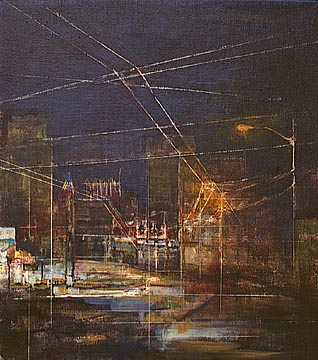| Psychogeography and the Dérive | 2004-07-23 15:35 2 comments |
 by Flemming Funch by Flemming FunchWhat is Psychogeography: Psychogegraphy is the study of the effects of geographical settings, consciously managed or not, acting directly on the mood and behaviour of the individual".Hm, sounds intriguing. But I'm not sure I get it. What exactly do you do? Wikipedia has some more details and types of psychogeography: Disagreements have led to many variations in the practice which have included the following forms: Debordian; Literary; Generative or Algorithmic; and Quantum. Various factions claim to be or accuse each other of being: academic; occultist; avant-garde; proletarian; or revolutionary.Just makes me more confused. I seem to get a better idea from this text: Psychogeography and the dérive. ...The situationists' desire to become psychogeographers, with an understanding of the 'precise laws and specific effects of the geographical environment, consciously organized or not, on the emotions and behaviour of individuals', was intended to cultivate an awareness of the ways in which everyday life is presently conditioned and controlled, the ways in which this manipulation can be exposed and subverted, and the possibilities for chosen forms of constructed situations in the post-spectacular world. Only an awareness of the influences of the existing environment can encourage the critique of the present conditions of daily life, and yet it is precisely this concern with the environment which we live which is ignored.So, like an awareness of the stuff of pattern languages in the environment. Charting how environments influence us, based on some kind of non-linear exploration. Mapping outer invironments based on inner states. And changing the rules about how we relate to the environment. An infinite game. What is a dérive? Concealed by the functional drudgery of city life, such areas of psychogeographical research were seen as the ground of a new realm of experiment with the possibilities of everyday experience.Hm, what a weird and splendid idea. Anyway, this all seems to fit into my ongoing quest for the deeper patterns of life, beyond the superficial and confusing details that are swirling around us. An example of a situation-creating technique is the dérive. The dérive is the first step toward an urban praxis. It is a stroll through the city by several people who are out to understand the "psychogeographical articulation of the modern city". The strollers attempt an interpretive reading of the city, an architectural understanding. They look at the city as a special instance of repressed desires. At the same time, they engage in "playful reconstructive behavior". Together they turn the city around. They see in the city unifying and empowering possibilities in place of the present fragmentation and pacification. This "turning around" or détournment is a key strategic concept of the Situationists. Détournment is a dialectical tool. It is an "insurrectional style" by which a past form is used to show its own inherent untruth-- an untruth masked by ideology. It can be applied to billboards, to written texts, to films, to cartoons, etc., as well as to city spaces. Marx used it when he "turned Hegel on his head." He used the dialectic in the study of history to expose the ideological nature of Hegel's idealism. The Situationists use détoumement to demonstrate the scandalous poverty of everyday life despite the plenty of commodities. They attempted to demonstrate the contrast between what life presently is and what it could be. They wanted to rupture the spell of the ideology of our commodified consumer society so that our repressed desires of a more authentic nature could come forward. The situation is based on liberated desires rather than alienated ones. What these desires are cannot be stated a priori. They will emerge in the revolutionary process of situation-creation, of détournment. Presumably, communality, unification, and public urban space will emerge as more desirable than commodification, fragmentation, and privatization.OK, not the easiest stuff to read, but I like it. Wonder who's doing things like that around here. Sounds like something French avantgarde art and philosophy types would easily get into. |